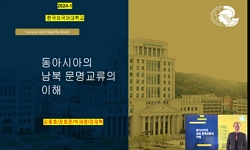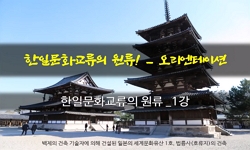This article was written to promote exchanges and cooperation between the two Koreas based on their understanding of the cultural heritage of the two Koreas. The DMZ is the last existing Cold War heritage and a living war heritage. At the same time, a...
http://chineseinput.net/에서 pinyin(병음)방식으로 중국어를 변환할 수 있습니다.
변환된 중국어를 복사하여 사용하시면 됩니다.
- 中文 을 입력하시려면 zhongwen을 입력하시고 space를누르시면됩니다.
- 北京 을 입력하시려면 beijing을 입력하시고 space를 누르시면 됩니다.
DMZ 세계유산 등재 논의 성과와 과제: 남북 문화유산 정책포럼을 중심으로 = DMZ World Heritage List Discussion Results and Challenges: Focusing on the North-South Korean Cltural Heritage Policy Forum
한글로보기https://www.riss.kr/link?id=A106980341
- 저자
- 발행기관
- 학술지명
- 권호사항
-
발행연도
2020
-
작성언어
-
-
주제어
비무장지대 ; 세계유산 ; 남북문화유산 ; 이코모스 ; 교류 ; DMZ ; Cultural Heritage ; World Heritage ; Inter-Korean Exchange ; Cold War Heritage ; War heritage
-
KDC
600
-
등재정보
미등재
-
자료형태
학술저널
-
수록면
1-12(12쪽)
- DOI식별코드
- 제공처
-
0
상세조회 -
0
다운로드
부가정보
다국어 초록 (Multilingual Abstract)
This article was written to promote exchanges and cooperation between the two Koreas based on their understanding of the cultural heritage of the two Koreas. The DMZ is the last existing Cold War heritage and a living war heritage. At the same time, as a result of the 70-year-old Cold War, it has outstanding universal value in that it is a monumental legacy of the Korean Peninsula’s ecosystem and biodiversity conservation. Despite the value of the DMZ that the Korean Peninsula has, there are many differences in the perception between the two Koreas. While South Korea wants to use the DMZ as a springboard for peace on the Korean Peninsula, North Korea sees the DMZ as something that needs to be removed for unification. This fact is an important task to overcome before promoting the registration of the DMZ as a World Heritage Site. We may have focused only on the establishment of a peace zone for the registration of world heritage rather than on dreaming of the past, present and future values of the DMZ. It seems that serious and open discussions on “What is the DMZ for us?” and “How should we look at the DMZ?” and “How should we interpret the DMZ?” are needed before pushing for the DMZ’s World Heritage site with a long breath away from the short-term temptation.
동일학술지(권/호) 다른 논문
-
- 국제문화&예술학회
- 유대용 ( You Dae-yong )
- 2020
- 미등재
-
전국 치매안심센터 무용프로그램 활동 현황 : 주요 8개 지역 중심으로
- 국제문화&예술학회
- 김예원 ( Kim Ye-won )
- 2020
- 미등재
-
- 국제문화&예술학회
- 송미숙 ( Song Mi-sook )
- 2020
- 미등재
-
- 국제문화&예술학회
- 심세영 ( Shim Se-young )
- 2020
- 미등재




 KISS
KISS






